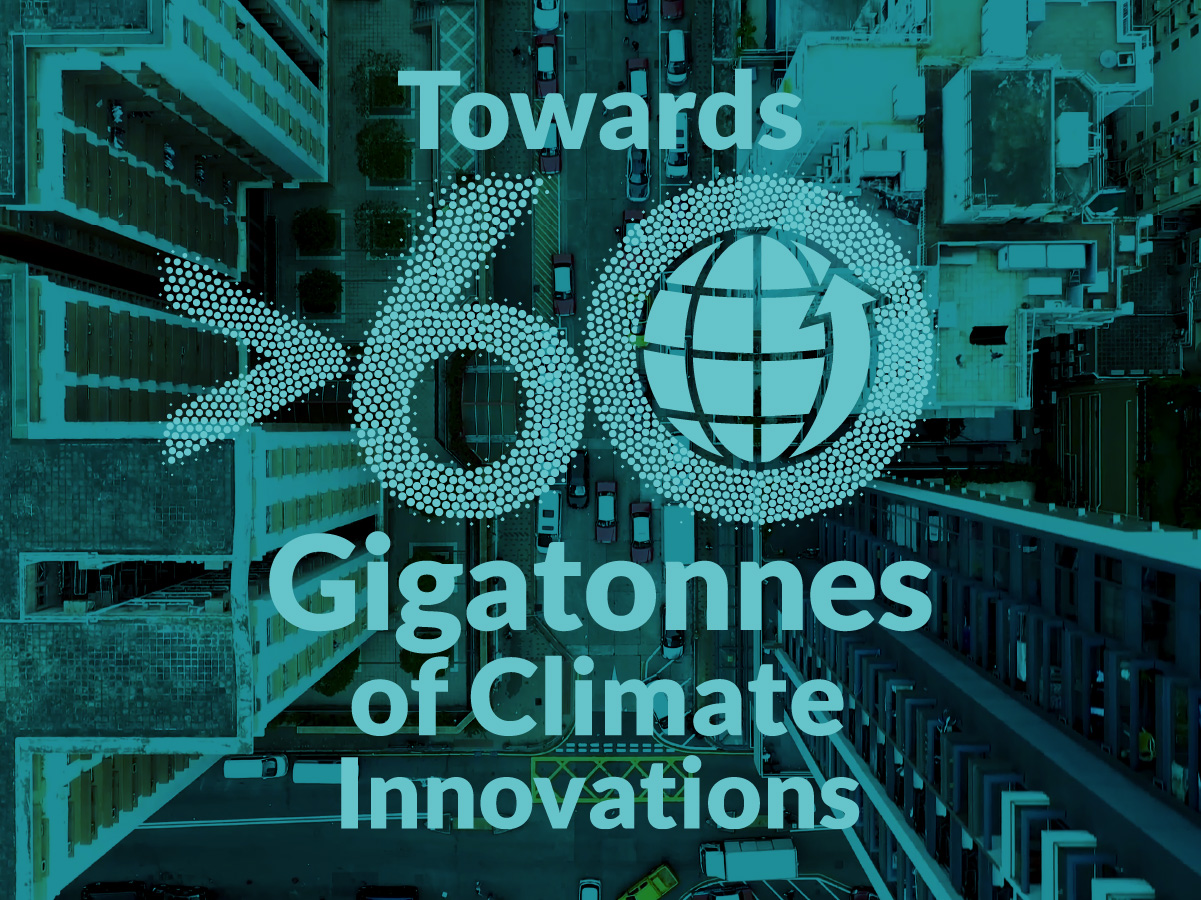Nominated innovations
1000 innovative clean energy solutions and > 150 framework enablers with the potential to deliver more than twelve gigatonnes of avoided emissions by 2030
These assessments are based on a basic avoided emission assessment. The overall concept of avoided emissions is that a solution (product or service) enables the same function to be performed with significantly less GHG emissions. The method of measuring avoided emissions, is to compare a baseline scenario without the enabling solution, with a scenario using the enabling solution; whereby the baseline represents the ‘business as usual’ (BAU) scenario.
These assessments are based on the framework document: The Avoided Emissions Framework (AEF) from September 2020

Doubling biopower plant electrical efficiency
Today's established technology for bio power is the steam cycle, in which 30 percent of the energy input results in electricity, with the remainder being heat and energy losses. Bio power plants are therefore primarily heating plants and, secondly, producers of electricity. Phoenix Biopower's technology has developed a different thermodynamic process. The first step is that the fuel is gasified under high pressure together with steam. The gas formed then drives a gas turbine where steam is used to optimize combustion. With this technology, efficiency is doubled, and electricity can be produced with up to 60 percent of the energy input.
Sweden
≈10

Phoenix Biopower AB
Doubling biopower plant electrical efficiency
Today's established technology for bio power is the steam cycle, in which 30 percent of the energy input results in electricity, with the remainder being heat and energy losses. Bio power plants are therefore primarily heating plants and, secondly, producers of electricity. Phoenix Biopower's technology has developed a different thermodynamic process. The first step is that the fuel is gasified under high pressure together with steam. The gas formed then drives a gas turbine where steam is used to optimize combustion. With this technology, efficiency is doubled, and electricity can be produced with up to 60 percent of the energy input.
≈10Mt CO2e/year

Pi2
Pi2 wrote: You know prefab wood walls ? used in new-build, for an extension or for an external insulation, they present a strong interest for ecological habitat. Even more when the service proposed by pi2 can cut the costs by 25%, being competitive with regards to concrete. « our approach is comparable to a fablab for craftmen : we provide professionals with an open access. To our innovative machine and we teach them how to use it » says jean pierre dufay, its inventor who has worked 30 years in the field... Source: EIT Climate KIC's ClimateLaunchPad
France

Pi2
Pi2
Pi2 wrote: You know prefab wood walls ? used in new-build, for an extension or for an external insulation, they present a strong interest for ecological habitat. Even more when the service proposed by pi2 can cut the costs by 25%, being competitive with regards to concrete. « our approach is comparable to a fablab for craftmen : we provide professionals with an open access. To our innovative machine and we teach them how to use it » says jean pierre dufay, its inventor who has worked 30 years in the field... Source: EIT Climate KIC's ClimateLaunchPad
Currently unavailable

Pick it easy
Pick it easy wrote: Our solution is a service where we collaborate with supermarkets to take the order of the customers online. The supermarket prepares the order and we ship it directly into lockers that people can open with a code. These lockers are strategically located to "collecting points" that are close to where people live. To resume, we want to decentralize grocery shoppping by reducing the distance between the people and their groceries. The customer can choose at what day he wants to pick up his groceries and have all the day to pick it up. The delivery from the supermarket to the lockers would only be once a day, and all the customers cover a really small distance to go to these lockers... Source: EIT Climate KIC's Climathon
Iceland

Pick it easy
Pick it easy
Pick it easy wrote: Our solution is a service where we collaborate with supermarkets to take the order of the customers online. The supermarket prepares the order and we ship it directly into lockers that people can open with a code. These lockers are strategically located to "collecting points" that are close to where people live. To resume, we want to decentralize grocery shoppping by reducing the distance between the people and their groceries. The customer can choose at what day he wants to pick up his groceries and have all the day to pick it up. The delivery from the supermarket to the lockers would only be once a day, and all the customers cover a really small distance to go to these lockers... Source: EIT Climate KIC's Climathon
Currently unavailable

Offgrid sawmilling
Pikotech wrote: Pikotech offers affordable and efficient sawmilling and bioenergy solutions for remote pine forest owners in developing countries. Our beachhead markets are in rural areas of tanzania and nepal where there is development aid supported pine plantations in the community land and where people do not have access to reliable electricity. We have picked these markets as there are existing capacity building projects, we have strong personal networks and team members who have experience in working in these areas. Our solution is modified to work in local context by taking off extra high-tech functions and modifying component structure to enable local maintainability... Source: EIT Climate KIC's ClimateLaunchPad
Finland

Pikotech
Offgrid sawmilling
Pikotech wrote: Pikotech offers affordable and efficient sawmilling and bioenergy solutions for remote pine forest owners in developing countries. Our beachhead markets are in rural areas of tanzania and nepal where there is development aid supported pine plantations in the community land and where people do not have access to reliable electricity. We have picked these markets as there are existing capacity building projects, we have strong personal networks and team members who have experience in working in these areas. Our solution is modified to work in local context by taking off extra high-tech functions and modifying component structure to enable local maintainability... Source: EIT Climate KIC's ClimateLaunchPad
Currently unavailable

Natural Wood Protection
Pinelinite wrote: Pinelinite has been developed as a direct replacement for creosote, creocote and other toxic wood treatments. Pinelinite is 100% natural and non toxic and environmentally friendly. It requires zero energy consumption to produce gate to gate. The treatment uses 100% natural and sustainable materials in its production. Pinelinite also has zero ozone depleting voc's... Source: EIT Climate KIC's ClimateLaunchPad
United Kingdom

Pinelinite
Natural Wood Protection
Pinelinite wrote: Pinelinite has been developed as a direct replacement for creosote, creocote and other toxic wood treatments. Pinelinite is 100% natural and non toxic and environmentally friendly. It requires zero energy consumption to produce gate to gate. The treatment uses 100% natural and sustainable materials in its production. Pinelinite also has zero ozone depleting voc's... Source: EIT Climate KIC's ClimateLaunchPad
Currently unavailable

pink bacteria as sustainable aquafeed
PINKtech wrote: Pinktech uses easy manageable natural biological materials - a small cute. Pink bacterium - to feed aquatic organims, improving. Viability, color and fecundity while also improving the quality of the ‘ habitats’ ... Source: EIT Climate KIC's ClimateLaunchPad
Portugal

PINKtech
pink bacteria as sustainable aquafeed
PINKtech wrote: Pinktech uses easy manageable natural biological materials - a small cute. Pink bacterium - to feed aquatic organims, improving. Viability, color and fecundity while also improving the quality of the ‘ habitats’ ... Source: EIT Climate KIC's ClimateLaunchPad
Currently unavailable

Online fundraising platform
Pitchapitch wrote: Pitchapitch is an online crowdfunding and networking website, created specifically for cleantech projects, connecting innovative enthusiasts and investors/donators onone platform and providing professional business support... Source: EIT Climate KIC's ClimateLaunchPad
Azerbaijan

Pitchapitch
Online fundraising platform
Pitchapitch wrote: Pitchapitch is an online crowdfunding and networking website, created specifically for cleantech projects, connecting innovative enthusiasts and investors/donators onone platform and providing professional business support... Source: EIT Climate KIC's ClimateLaunchPad
Currently unavailable

PlanArrivals
PlanArrivals wrote: Cesis municipality is located in the sensitive nature area that gets increasingly popular among visitors and is going to need extra protection in the future in order to keep the unique value of the fragile ecosystem. City gets irregular streams of visitors during the festivals and other events where additional services are needed from the municipality such as overnight stay options, waste management, public toilets, etc. The final solution is going to provide data mining and modelling services to the municipalities. Publicly available data is going to be analysed; in addition, the calculation of the visitors at the current moment is going to be performed... Source: EIT Climate KIC's Climathon
Latvia

PlanArrivals
PlanArrivals
PlanArrivals wrote: Cesis municipality is located in the sensitive nature area that gets increasingly popular among visitors and is going to need extra protection in the future in order to keep the unique value of the fragile ecosystem. City gets irregular streams of visitors during the festivals and other events where additional services are needed from the municipality such as overnight stay options, waste management, public toilets, etc. The final solution is going to provide data mining and modelling services to the municipalities. Publicly available data is going to be analysed; in addition, the calculation of the visitors at the current moment is going to be performed... Source: EIT Climate KIC's Climathon
Currently unavailable

Low-carbon environmental heat harvesting
Planet Heat wrote: It's really difficult to extract energy from (or dump it to) surface water because that water is dirtier than it appears. Traditionally it has to be abstracted (requiring a licence) and centrifugally filtered before it can be used. Our new method removes the need for abstraction and filtration, extracting the heat from the surface water using a small, energy-dense, submersible device. Over the past three years we have heated a real home using over 12 prototypes as proof-of-concept. We also have a published uk patent application (gb2553416a) and all the signs are that full scope of the claims will be granted... Source: EIT Climate KIC's ClimateLaunchPad
United Kingdom

Planet Heat
Low-carbon environmental heat harvesting
Planet Heat wrote: It's really difficult to extract energy from (or dump it to) surface water because that water is dirtier than it appears. Traditionally it has to be abstracted (requiring a licence) and centrifugally filtered before it can be used. Our new method removes the need for abstraction and filtration, extracting the heat from the surface water using a small, energy-dense, submersible device. Over the past three years we have heated a real home using over 12 prototypes as proof-of-concept. We also have a published uk patent application (gb2553416a) and all the signs are that full scope of the claims will be granted... Source: EIT Climate KIC's ClimateLaunchPad
Currently unavailable

Planeta Renewables s.r.l.
Planeta Renewables s.r.l. wrote: Our purpose is to realize and enhance an industrial supply-chain focused on the use of. Non-food lignocellulosic plant called miscanthus giganteus. This biomass is one of. More promising energy crop that grows on marginal, uncultivated, degraded lands and. Not suitable for food crops. Its uses are numerous: clean energy, biofuels, biomaterials,. Bioplastics, packaging and non-wood paper... Source: EIT Climate KIC's ClimateLaunchPad
Italy

Planeta Renewables s.r.l.
Planeta Renewables s.r.l.
Planeta Renewables s.r.l. wrote: Our purpose is to realize and enhance an industrial supply-chain focused on the use of. Non-food lignocellulosic plant called miscanthus giganteus. This biomass is one of. More promising energy crop that grows on marginal, uncultivated, degraded lands and. Not suitable for food crops. Its uses are numerous: clean energy, biofuels, biomaterials,. Bioplastics, packaging and non-wood paper... Source: EIT Climate KIC's ClimateLaunchPad
Currently unavailable